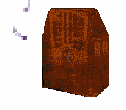

By Belinda Anderson
Outside. Inside. Upstairs. Downstairs. There was no escaping the music.
Not that anyone wanted to. The people who gathered at the Cultural Center Saturday for the third Vandalia Gathering even braved chilly weather for the outdoor events.
And if applause was an indication of success, then the directors of the three-day affair, which began Friday, must have been happy. At 1 p.m. the old-time fiddling competition started on the Capitol lawn. The wind created microphone problems, but the fiddling continued.
ALL THE SEATS were filled and more people were standing. The first contestant was helped up the steps, but Mike Humphreys was on firm ground with his fiddle. The audience responded to "Sally Johnson" with foot-stomping, clapping and knee-slapping. One elderly couple started dancing.
Across the lawn, the blues were being sung.
Downstairs in the Cultural Center, Ethel Caffie was conducting a workshop in black gospel singing. She is the director of the Charleston-based Collegiate Gospel Choir.
The joy in the music was evident. The warm, solid beat ruined "Oh Happy Day" into an expression of gladness. Black and white voices mingled with emotion.
IN A CORNER of the museum, a fiddler and guitarist were making impromptu music.
The notes from a dulcimer dominated upstairs.
Besides music, tinsmithing, blacksmithing, and pitchfork- making workshops were outside. Inside, the Rev. Herman Myers of Point Pleasant was displaying his wood creations.
Hayes said, "I like to make things that have never been made before." Some are humorous, like the carving of a moonshiner making a getaway. His depiction of a baseball game brought $3,000. Much of his work, however, has an air of human suffering, which Hayes said he sees a lot of in his ministry.
Music dominated the festival, featuring "The Golden Age of Radio." One of Saturday’s workshops brought together a group of people whose music in the 1930s and ‘40s was well-known to "Farm Hour" listeners.
The Bailes Brothers -- mandolin player Ernest Ferguson, fiddler Slim Clere, Rex and Eleanor Parker and Buddy Starcher -- needed no introduction to most of the audience. Neither did many of their songs -- Starcher’s "I’ll Still Write Your Name in the Sane." the Bailes’ "Dust on the Bible," the Parkers "Build Your Treasures in Heaven," and Clere’s "Sweet Fern."
IN AN INTERVIEW following the workshop, Walter and Kyle Bailes, Ferguson and Starcher reminisced about a time when a music career had to be supplemented (by other employment).
"I worked for five years before I knew I was supposed to get paid," 73-year old Starcher recalled. His interest in music began with his father, who played the fiddle.
Starcher was brodcasting before the invention of radio. With the phone system then, five short rings meant that everyone was supposed to listen in. What they often heard was Starcher playing the banjo and singing as he stood on a stool, accompanied (by) The Starchers (who) willingly played requests.
Starcher also recalled his one-hour show in Gastonia, N.C. In return for his board -- sleeping in the studio -- he swept the place. His salary came from selling typed copies of his songs. The money was spent for "livermush" and a loaf of bread. Starcher now lives in Craigsville.
THE BAILES also remember the struggle for survival before they reached the Grand Ole Opry in Nashville, Tenn. Their father died when the children were young. Growing up during the depression, they turned to music for their entertainment. They were encouraged by their mother, to whom they dedicated the song, "Mother Can Wear My Crown." Walter lives in Gatlinburg, Tenn., and Kyle in Birmingham, Ala.
Ernest Ferguson lives in Fairview, Tenn, now. His love for country music began with his neighbor’s crystal radio set. It was the only radio in the neighborhood, and the residents gathered regularly to listen to the Grand Ole Opry. "It was the big thrill of my life."
For the Bailes brothers, Christ is the most important thing in their lives now. Starcher also points to his Dec. 5, 1945 conversion as the turning point in his life.
Starcher’s advice to would-be Opry stars is to make the trip to Nashville. "Stop at the first gas station and if you can play better than the attendant, go on to the next and keep on going till you get to Nashville."
